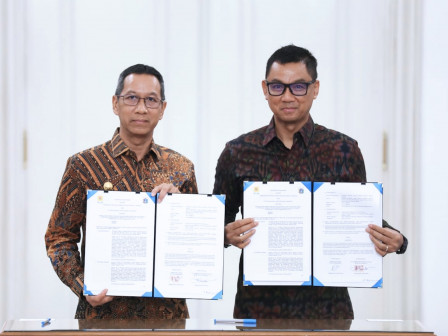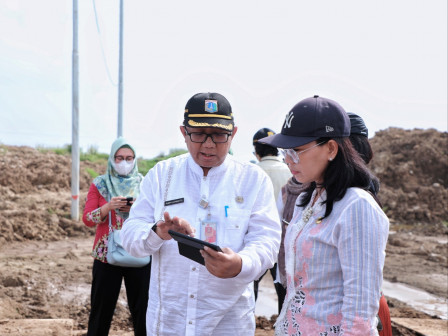Collaborating with PLN, City Turns Waste into Renewable Energy
Reported by Aldi Geri Lumban Tobing | Translated by Nugroho Adibrata
The Jakarta Provincial Government is working with the State Electricity Company PT PLN Persero in the context of accelerating the utilization of new renewable energy.
We want to ensure a better life for future generations
This acceleration is carried out by managing waste into Solid Jumputan Fuel (BBJP) which can be used by the Steam Power Plant (PLTU) sector as an energy source.
Its agreement was set forth in a memorandum of understanding (MoU) signed at Jakarta City Hall, Thursday (6/8), between Jakarta Acting Governor Heru Budi Hartono and PT PLN President Director Darmawan Prasodjo. Then, between City Secretary Joko Agus Setyono and PT PLN Energi Primer Indonesia President Director, Iwan Agung Firstantara.
Channel at PLN Gard Semper Barat Complex DrainedIt was motivated by the problem of waste in Jakarta, which produces more than 7,500 tons of waste per day. The Jakarta Government is trying to provide various types of waste processing facilities, both processing facilities that produce Refused Derived Fuel (RDF), as well as BBJP processing facilities such as those in cooperation with PT PLN, PLN even supports the construction of these facilities through the Social and Environmental Responsibility program.
On that occasion, the Acting Governor welcomed this collaboration, as it is an important form of commitment for Jakarta Government in efforts to overcome the waste problem. By so, waste management can be carried out efficiently without causing new impacts in the future.
"Hopefully, this collaboration can help overcome environmental problems through RDF. We realize that a change in the pattern of waste management is needed, from the collect-transport-dispose pattern to the use of waste as a resource," he expressed, as quoted by Jakarta PPID's press release, Friday (6/9).
He explained collaborative efforts in managing the environment, especially waste, must be solved collectively and supported by Jakarta people. It is because Jakarta is a national barometer, so it becomes an example of good waste management, thus waste can become a resource, while increasing energy security, and reducing greenhouse gas emissions.
PT PLN President Director, Darmawan Prasodjo appreciated this collaboration, as PT PLN would receive additional BBJP from Jakarta. He asserted PT PLN was committed to the energy transition in Indonesia by increasing the New and Renewable Energy (EBT) mix. This matter has been done with various initiatives, for instance PLN has made a roadmap to switch to green energy according to the Electricity Supply Business Plan (RUPTL). Meanwhile, the target is an additional 51.6 percent of EBT-based generators or around 20.9 gigawatts (GW) until 2030, including using BBJP from waste processing as co-firing PLTU.
"Principally, we want to ensure a better life for future generations. That is to overcome global warming or the greenhouse effect through the energy transition from fossil to renewable energy. This BBJP is part of renewable energy because it has zero emissions. So, this BBJP can be one of the solutions," he concluded.
As for the information, BBJP is a fuel derived from waste that has gone through a process of sorting and homogenizing into small grain sizes or formed into pellets that can be used as a substitute for fossil fuels.
Further, it will be used for co-firing biomass at the PLTU. Co-firing is a combustion process in a steam power plant using coal and a mixture of biomass fuels at the same time in a certain ratio. Therefore, the fuel needed by the PLTU would be more economical and environmentally friendly, as it mixes coal with BBJP.
Jakarta Government will try to produce BBJP from an RDF Plant in Jakarta that is capable of meeting the main requirements for BBJP product quality according to the standards required by PT PLN, including having an organic content of at least 80 percent.
Besides developingnand operating a waste processing facility into BBJP in the city with off taker PT PLN as fuel for power plants, the Jakarta Government has also operated a waste processing facility into RDF at the Bantargebang RDF Plant Facility with a capacity of 2,000 tons of waste per day with the cement factory offtaker.




